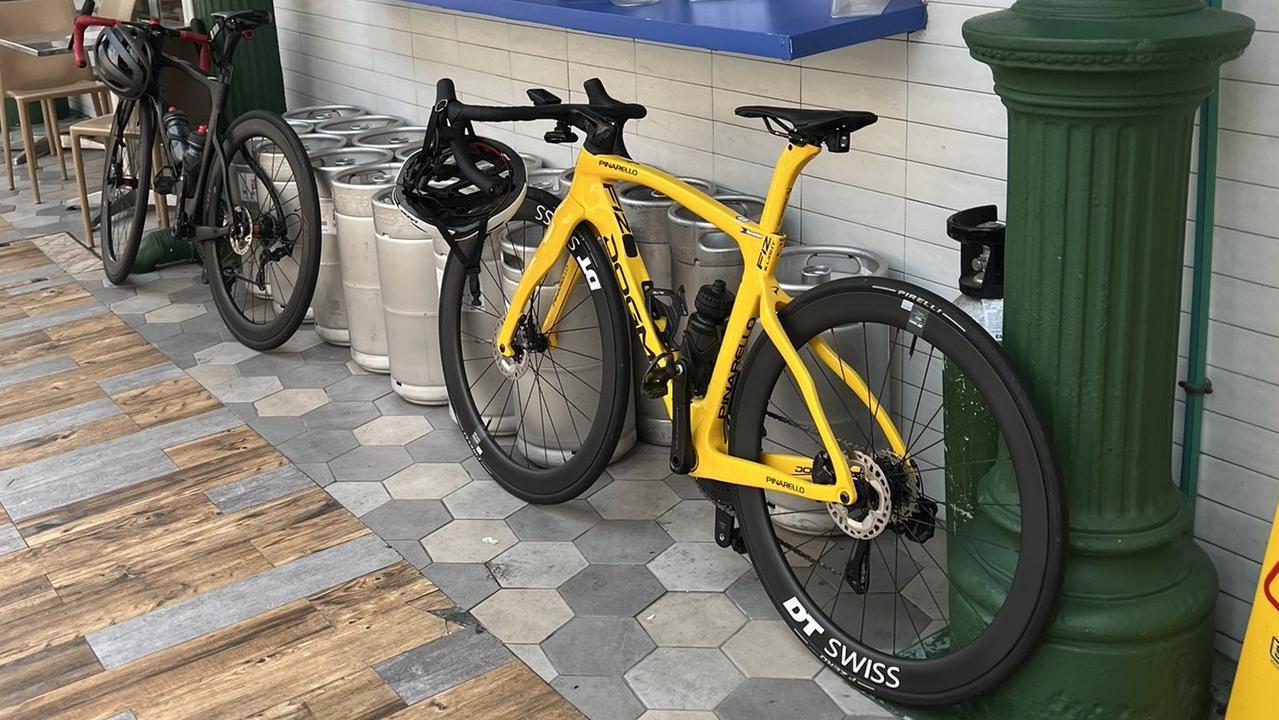[ad_1] An American tourist has gone viral online after expressing disbelief at the sight of a $US15,000 ($24,000) road bike left unattended on the s
[ad_1]
An American tourist has gone viral online after expressing disbelief at the sight of a $US15,000 ($24,000) road bike left unattended on the street in Singapore.
“The ultimate Singapore culture shock: a $15k bike left unattended,” Nick Whitaker wrote on X, sharing a photo of a yellow Pinarello Dogma F12 leaning against a wall next to a coffee shop.
The post has been viewed one million times on the platform since Monday, with users highlighting the obvious contrast in crime rates between Singapore and the United States.
Singapore, an island nation home to 5.6 million people, is notoriously tough on even petty crime and as a result has some of the lowest crime rates in the world.
In 2021, Singapore was ranked third in The Economist Intelligence Unit’s Safe Cities Index, behind Copenhagen and Toronto, although the authors noted in terms of crime rates Singapore scored equal best next to Tokyo and Osaka.
Whitaker, founding editor of Works in Progress magazine — part of payments platform Stripe — is based in New York, which like other major US cities is experiencing an unprecedented rise in crime.
Many users questioned why Singapore could control crime while the US struggled. “About a month [ago] in Singapore, a woman left an expensive bag on an outdoor table to hold it,” commented travel writer Charlie Hub.
“She then went into the McDonald’s at Raffles City Mall to order. My old NYC brain realised what had been out of place. I no longer needed my urban danger vigilance. It was a deeply cathartic experience.”
Finance professional Lyall Taylor added, “When I first moved to Singapore, I was stunned to see a friend I was meeting at a busy inner-city restaurant for lunch, ‘reserve’ us a spare table by leaving his phone unattended on said table while we ordered at the interior counter outside of eyeshot. He had no concern whatsoever of it being swiped.”
Mr Taylor claimed crime was “virtually non-existent in Singapore” due to “extremely strong deterrence … coupled with care about who they let in the country” that had created a “remarkably safe country with a pervasive, productively law-abiding culture”.
One X user argued “this should be the norm everywhere” and “anything less is a policy failure”, while another agreed “we could have this here too”.
“This is the type of ordinary, first-world behaviour that surprises Americans because their country has fallen so low, that the concept of civility is outlandishly incomprehensible to them,” one person wrote.
Another said, “Aspiring to this level of law and order should be like aspiring to clean drinking water: obvious and uncontroversial. Tolerating routine crime and disorder is like tolerating a poisoned water supply.”
Former NFL player Jake Bequette wrote, “We could live like this in America, but our leaders decide every day they’d rather have crime.”
Australia’s Department of Foreign Affairs and Trade (DFAT) warns travellers that Singapore has strict laws, including caning and the death penalty for serious drug offences.
It also harshly penalises so-called “outrage of modesty” offences or being drunk and disorderly in public.
“You should avoid any action that could be interpreted as molestation, including inappropriate touching or language,” DFAT says. “Penalties include jail, fines and caning.”
Singapore also has “strict laws and penalties for acts that are legal or minor offences in Australia”. “These include smoking in public places or restaurants, spitting, importing or chewing gum, chewing tobacco, littering and jaywalking,” DFAT says.
“Penalties are severe for crimes that affect social, racial or ethnic harmony. These include racial insults and promoting ill will and hostility between different races or classes.”
The number of physical crime cases rose 5.4 per cent in the first six months of 2023 to 10,080, but remains lower than pre-Covid numbers, according to the Singapore Police Force.
[ad_2]
Source link



COMMENTS